#I have psychosis
Explore tagged Tumblr posts
Text
Oh, the mortifying ordeal of being known through your writing on a very personal level
#can’t believe I actually posted that piece#I have psychosis#AND NOW EVERYONE KNOWS A BIG PORTION OF MY DELUSIONS#because like the psychotic bitch I am#I shared it with the internet in my fandoms#specifically#the fandom known for making people mentally ill over it#they truly have no poster child for a reader like me#hey get over here and make fun of me with me#ORV#orv side story#how to be a star writer#lee hakhyun#he’s not my blorbo#he’s sang-sang-ui’s#I’m just the current packaging#at least reality remains ridiculous enough that I shouldn’t be this embarrassed about my very public brand of insanity now#(unintelligible internal flailing gestures)#first fic on ao3 too#yikes
16 notes
·
View notes
Photo
you guys need to watch the skinny thing to make it move?
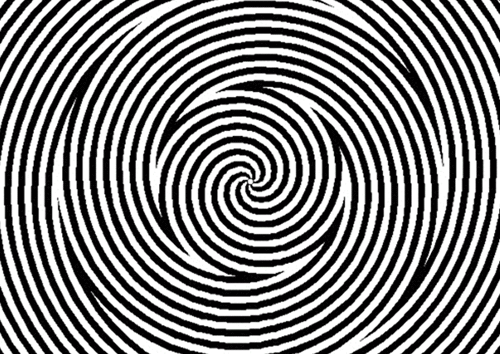
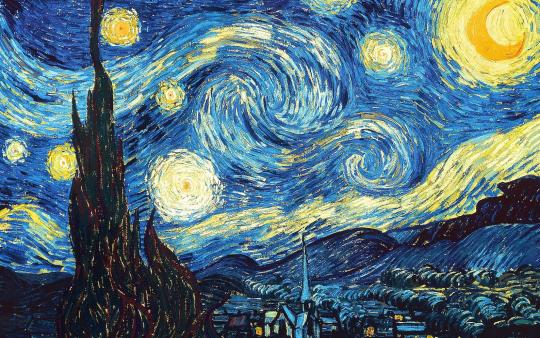
466K notes
·
View notes
Text
also in regards to that last article about varied ways of thinking about psychosis/altered states that don't just align with medical model or carceral psychiatry---I always love sharing about Bethel House and their practices of peer support for schizophrenia that are founded on something called tojisha kenkyu, but I don't see it mentioned as often as things like HVN and Soteria House.

ID: [A colorful digital drawing of a group of people having a meeting inside a house while it snows outside.]
"What really set the stage for tōjisha-kenkyū were two social movements started by those with disabilities. In the 1950s, a new disability movement was burgeoning in Japan, but it wasn’t until the 1970s that those with physical disabilities, such as cerebral palsy, began to advocate for themselves more actively as tōjisha. For those in this movement, their disability is visible. They know where their discomfort comes from, why they are discriminated against, and in what ways they need society to change. Their movement had a clear sense of purpose: make society accommodate the needs of people with disabilities. Around the same time, during the 1970s, a second movement was started by those with mental health issues, such as addiction (particularly alcohol misuse) and schizophrenia. Their disabilities are not always visible. People in this second movement may not have always known they had a disability and, even after they identify their problems, they may remain uncertain about the nature of their disability. Unlike those with physical and visible disabilities, this second group of tōjisha were not always sure how to advocate for themselves as members of society. They didn’t know what they wanted and needed from society. This knowing required new kinds of self-knowledge.
As the story goes, tōjisha-kenkyū emerged in the Japanese fishing town of Urakawa in southern Hokkaido in the early 2000s. It began in the 1980s when locals who had been diagnosed with psychiatric disorders created a peer-support group in a run-down church, which was renamed ‘Bethel House’. The establishment of Bethel House (or just Bethel) was also aided by the maverick psychiatrist Toshiaki Kawamura and an innovative social worker named Ikuyoshi Mukaiyachi. From the start, Bethel embodied the experimental spirit that followed the ‘antipsychiatry’ movement in Japan, which proposed ideas for how psychiatry might be done differently, without relying only on diagnostic manuals and experts. But finding new methods was incredibly difficult and, in the early days of Bethel, both staff and members often struggled with a recurring problem: how is it possible to get beyond traditional psychiatric treatments when someone is still being tormented by their disabling symptoms? Tōjisha-kenkyū was born directly out of a desperate search for answers.
In the early 2000s, one of Bethel’s members with schizophrenia was struggling to understand who he was and why he acted the way he did. This struggle had become urgent after he had set his own home on fire in a fit of anger. In the aftermath, he was overwhelmed and desperate. At his wits’ end about how to help, Mukaiyachi asked him if perhaps he wanted to kenkyū (to ‘study’ or ‘research’) himself so he could understand his problems and find a better way to cope with his illness. Apparently, the term ‘kenkyū’ had an immediate appeal, and others at Bethel began to adopt it, too – especially those with serious mental health problems who were constantly urged to think about (and apologise) for who they were and how they behaved. Instead of being passive ‘patients’ who felt they needed to keep their heads down and be ashamed for acting differently, they could now become active ‘researchers’ of their own ailments. Tōjisha-kenkyū allowed these people to deny labels such as ‘victim’, ‘patient’ or ‘minority’, and to reclaim their agency.
Tōjisha-kenkyū is based on a simple idea. Humans have long shared their troubles so that others can empathise and offer wisdom about how to solve problems. Yet the experience of mental illness is often accompanied by an absence of collective sharing and problem-solving. Mental health issues are treated like shameful secrets that must be hidden, remain unspoken, and dealt with in private. This creates confused and lonely people, who can only be ‘saved’ by the top-down knowledge of expert psychiatrists. Tōjisha-kenkyū simply encourages people to ‘study’ their own problems, and to investigate patterns and solutions in the writing and testimonies of fellow tōjisha.
Self-reflection is at the heart of this practice. Tōjisha-kenkyū incorporates various forms of reflection developed in clinical methods, such as social skills training and cognitive behavioural therapy, but the reflections of a tōjisha don’t begin and end at the individual. Instead, self-reflection is always shared, becoming a form of knowledge that can be communally reflected upon and improved. At Bethel House, members found it liberating that they could define themselves as ‘producers’ of a new form of knowledge, just like the doctors and scientists who diagnosed and studied them in hospital wards. The experiential knowledge of Bethel members now forms the basis of an open and shared public domain of collective knowledge about mental health, one distributed through books, newspaper articles, documentaries and social media.
Tōjisha-kenkyū quickly caught on, making Bethel House a site of pilgrimage for those seeking alternatives to traditional psychiatry. Eventually, a café was opened, public lectures and events were held, and even merchandise (including T-shirts depicting members’ hallucinations) was sold to help support the project. Bethel won further fame when their ‘Hallucination and Delusion Grand Prix’ was aired on national television in Japan. At these events, people in Urakawa are invited to listen and laugh alongside Bethel members who share stories of their hallucinations and delusions. Afterwards, the audience votes to decide who should win first prize for the most hilarious or moving account. One previous winner told a story about a failed journey into the mountains to ride a UFO and ‘save the world’ (it failed because other Bethel members convinced him he needed a licence to ride a UFO, which he didn’t have). Another winner told a story about living in a public restroom at a train station for four days to respect the orders of an auditory hallucination. Tōjisha-kenkyū received further interest, in and outside Japan, when the American anthropologist Karen Nakamura wrote A Disability of the Soul: An Ethnography of Schizophrenia and Mental Illness in Contemporary Japan (2013), a detailed and moving account of life at Bethel House. "
-Japan's Radical Alternative to Psychiatric Diagnosis by Satsuki Ayaya and Junko Kitanaka
#personal#psych abolition#mad liberation#psychosis#altered states#antipsych#antipsychiatry#mad pride#peer support#schizophrenia#i have a pdf of the book somewhere if anyone wants#the book and the documentary also discuss some of the pratical struggles in creating a community like this which i also found helpful as#someone who is very interested in helping open a peer respite.
2K notes
·
View notes
Text
guys i’m going fucking bonkers i’m literally insane why am i having delusions of actually fucking being spiderman i can’t
0 notes
Text
We need to talk about how so many queer spaces are inaccessible and even actively hostile to physically disabled people.
#chronic disability#chronic pain#fibromyalgia#spoonie#physical disability#cripplepunk#queer spaces#lgbtq#lgbt#queer#disability#and i am specifically not including neurodivergence in this because many of these spaces are openly welcome to neurodivergence#other than maybe stuff like narcissism psychosis and schizophrenia#bc i have seen hostility to those exceptions#wrenfea.txt
9K notes
·
View notes
Text
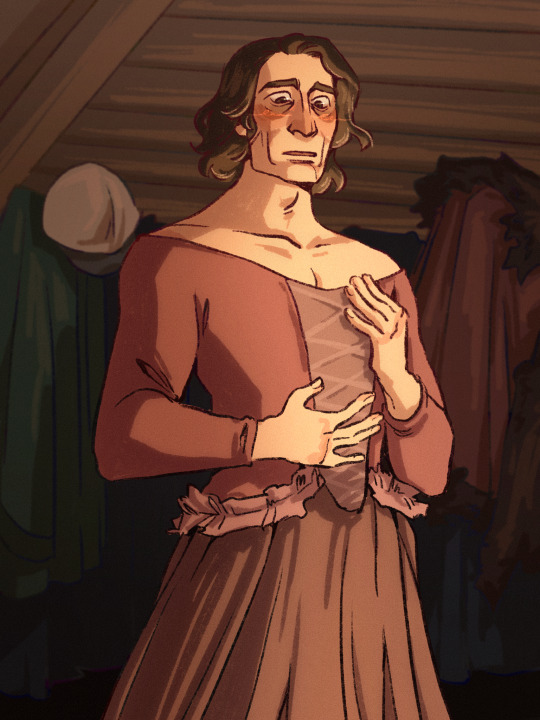
“Here comes a feminine urge,
I know it so well”
Rip James Fitzjames you would’ve loved drag
#also pls don’t get used to me posting this often#unfortunately I have a big girl job with big girl responsibilities so I usually don’t have that much time to draw#rn I’m in my hyperfixation psychosis where I need to pump out 167273 drawings within a few days or I’ll explode#but yeah anyway#the terror#the terror amc#james fitzjames#jfj#froggerart
573 notes
·
View notes
Text


clinging to corpses
#ff7#ffvii#fanart#i finished cc#hahahahahahaha (glass shattering sfx) (wilhelm scream) (crash sfx) (car alarm) (police sirens)#sephiroth#cloud strife#mine#doodles#im going to barf#btw i have like five trillion drawings of sephi curled in a ball w her mom#anyways. this drawing is brought to you by grief fueled psychosis! (i guess mako fueled too)#cw eyestrain#eyestrain#zack is not here but in case it wasnt clear. the corpse is zack (and ang's) lol
1K notes
·
View notes
Text
> new series release (space babies) coincided with the uk seeing the northern lights for the first time in years
> the devil’s chord coincided with paul mccartney’s long-missing hofner bass guitar being found, by a doctor who fan no less
> boom coincided with an actual meteor crash
> 73 yards is coinciding with a rise in bizarre supposedly-occult animal sacrifice rituals in britain (the folk horror part) and rishi sunak finally calling a general election (the political drama part)
> hypothesis: russell t davies has somehow managed to tune in to the universe’s divine frequency ??
> conclusion: messing with the forces of fate, cause&effect and coincidence, even if it’s for the pop culture franchise you’re showrunning, actually turns it into an egregore, but only if it’s been going for long enough (sixty fucking years to the dot) and watched by enough people (tens of millions). which it has
> ergo, postscriptum: television magick is real and is being unintentionally performed by the creators + audience of the world’s silliest science fiction show
> /jk. unless?
#p.p.s. i am not insane i do not have psychosis. what i do have is imagination!#if you say oMg oP wHaT arE yOu SmOkInG you’re getting blocked#have an ounce of whimsy. entertain the possibility that not everything is explicable#i could be into actually harmful conspiracy theories; like lizard people (antisemitic) or anti-vax. think about that#doctor who meta#doctor who#dw#dw meta#doctor who series 14#russell t davies#fifteen#fifteenth doctor#ncuti gatwa#nuwho#ruby sunday#the church on ruby road#73 yards#space babies#boom#the devil’s chord#esquivalience#pop culture magic#kitty.txt#👁️
1K notes
·
View notes
Text
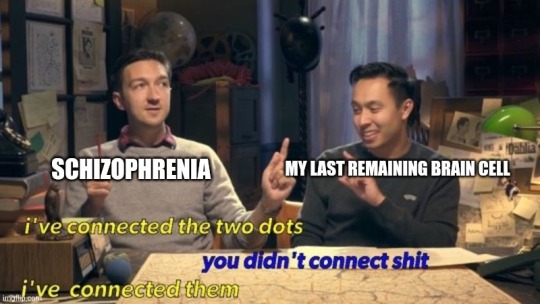
#the soup talks#schizoaffective#actually schizospec#schizophrenia#psychosis#actually schizophrenic#delusions#struggling right now to not see connections when they keep adding up#i have a feeling it's going to lead to a delusion so I'm trying to prevent it all
648 notes
·
View notes
Text
Another mentally unwell Wade post:
"Fuck off, fuck off, fuck off" Logan hears Wade hiss as he wiggles his way under the covers. It takes a moment before he realizes Wade trying to pull Logan's heavy body ontop of himself.
"Bub?" He groggy says, flipping over, careful not to crush Wade who makes a pathetic sound. "What's going on?"
"They are watching me." Comes the muffle under the covers. "They are looking through the blanket at me, fuck Logan. Please help"
He knows this is serious, he's never called by his name. It's always peanut, Sweetpea, baby girl, or some other annoyingly cutesy nickname. Logan takes the blankets and wrap them tightly around the other, before half laying ontop of Wade. An arm and leg thrown over Wade's body, letting his full body weight to press down into the other. It takes a little wiggling, a broken sob, and some light swearing before Wade settles all of 30 seconds. He starts curling in tighter to himself, trying to make himself feel small.
"Fuck a truck, I was doing fine. I was doing so okay but now. Fuck"
Being Wade's weighted blanket was something he liked being. He hated that most of the time it's all he could do to help the other.
"I know they aren’t there, aren't real, but Fuck me up, Logan, they are there for me. The eyes, they are there when i'm not looking."
"They are there enough to upset you. How can I help you?"
"Crush me, crush me, please."
"Okay, okay" Logan moves, trying to ignore the soul crushing sound coming from the other as he does so. He moves to hover over Wade's bundled form, arms and lets caging Wade in, before flopping his whole body wight on the other. There is a small "oof" that comes from the bundle he's laying on. It only takes a few seconds before Wade settles for good. Its not the most comfortable way to sleep, but he'd deal.
Logan would deal with one night of shitty sleep, hell he'd deal with 1000 nights, if it ment Wade's mind would stop hurting him.
#tw hallucinations#tw psychosis#tw mental illness#poolverine#deadpool and wolverine#deadpool#logan howlett#wade wilson#deadclaws#can I have my hairball hallucination back? that was at least funny compared to this.
374 notes
·
View notes
Text
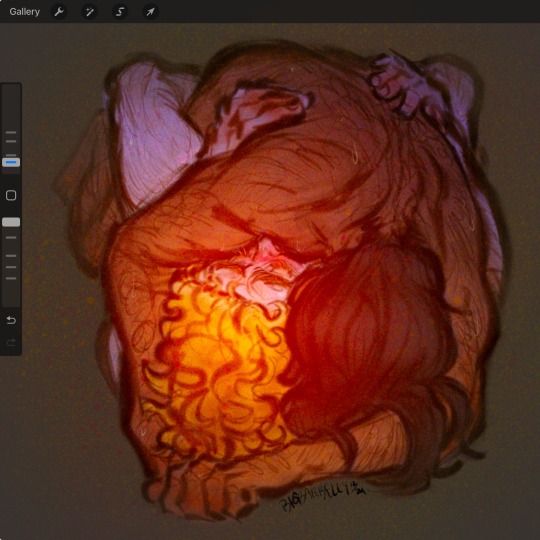
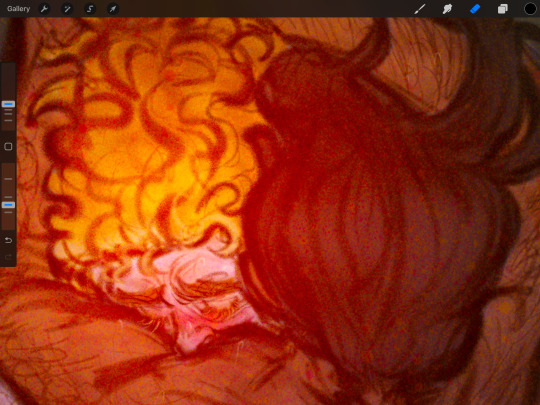
Not home but something familiar
#this is tasteful let me post without covering shit up tumbl#art#Idk what to call this cause it’s not clean lineart but way more than a sketch#frankly I’m sick of clean lineart and i might redo my coms for stuff like this instead idk#jimmy#curly#jimcurly#mouthwashing#curly is disgusting for him it’s probably clinical#I wanna see them together not destroyed by capitalism maybe they would have been better people not riddled with sleep deprived psychosis
255 notes
·
View notes
Text
Once again thinking about the ATLA post series (not in continuity with the comics) fanfic I'll never write that follows Azula going to work in Iroh's tea shop in Ba Sing Se and her ensuing struggle with psychosis and realizing she was in the wrong and is just as much the victim of an abusive parent as Zuko was.
In this story Iroh tries to help her and at first she HATES it. She hates his kindness, she hates the sadness on his face when he sees her struggling, she hates all of it. At one point she snaps at Iroh to stop pitying her and he says, "Don't you know the difference between compassion and pity?" And she snaps back that they're the same thing and he replies, "You're wrong, Azula. Pity is simply feeling sad for someone's circumstances. Compassion is the desire for their circumstances to get better." And it hits her like a ton of bricks that this man, unlike her father, wants what's best for her. He's only ever treated her with kindness and she's disrespected him and called him weak for it and it's the most actual love she's ever received from a father figure in her fifteen years of life. And she wants nothing more than to cry in his arms but she can't yet because she doesn't know how to show weakness in front of anyone because of what her father did to her.
I see a post floating around sometimes where someone said that as a child, Azula is the scariest character, but as an adult, she's the saddest and I agree. She was 15. She deserves a redemption arc.
#maybe someday I'll write it#I know the struggle of having a cruel parent teach you to be cruel#and having to realize that your own cruelty is hurting you and you need to learn to be better#and struggling with psychosis while this realization is happening#I think I'm uniquely suited to tell this story but I don't have enough to start writing yet#atla#avatar the last airbender#azula
1K notes
·
View notes
Text
News I've gathered from the Pathologic 3 section of the Safe & Sound event today!
We had our first glimpse of the Capital ever! Along with a year- 1924, a date which could be arbitrary (since it's a hundred years ago exactly and was part of a bit on time travel) but it's still something to consider!

Quoting Vasily Kashnikov: "The Bachelor communicates with those in power so the soundtrack contains a fair share of minimalist so called "furniture music" that could sound in the salons of the beginning of the last century, piano etudes and references of that time, Satie, Debussy etcetera."
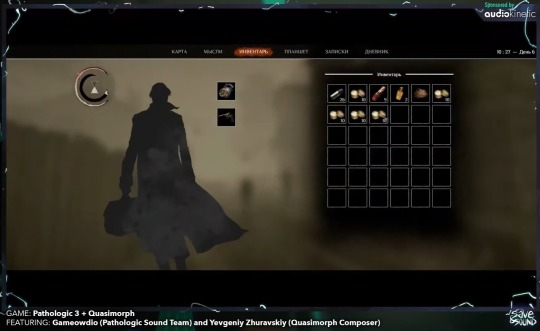
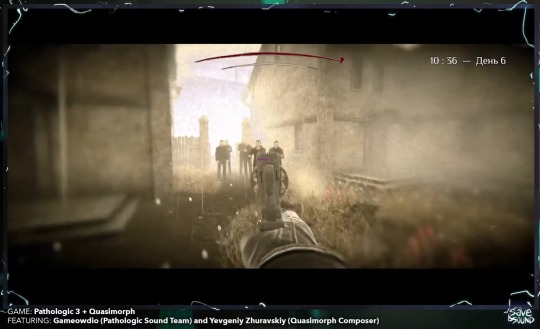
Quoting Natalya Radylina: "The music changes depending on the state of the Bachelor himself, who can fall into Apathy or Psychosis. [...] If the Psychosis level goes to the maximum it starts to damage Bachelor's health." THEY ARE PUTTING HIM IN THE TORTURE LABYRINTH and combat seems to NOT be gone and actually be a greatly determining factor of the Bachelor's sanity!
New shots of the Town Hall's exterior (Inside they showed the strange brass clock we saw in the preview pictures) and of the Town on Gorkhon itself:
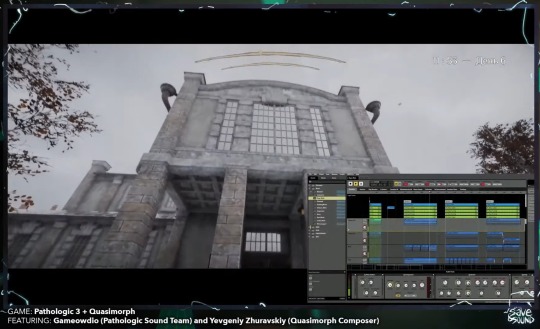
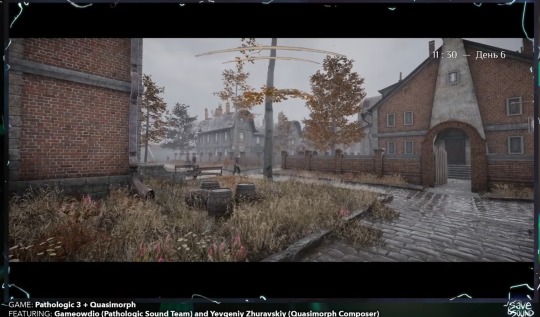
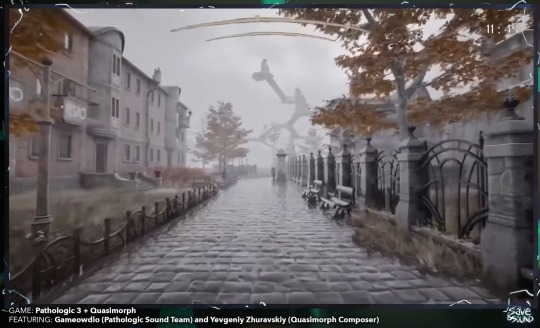
Still quoting Natalya Radylina: "In the Cathedral there is a system of levers (?) that control the direction and speed of time."
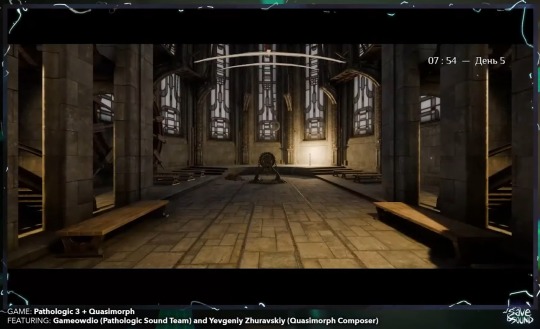
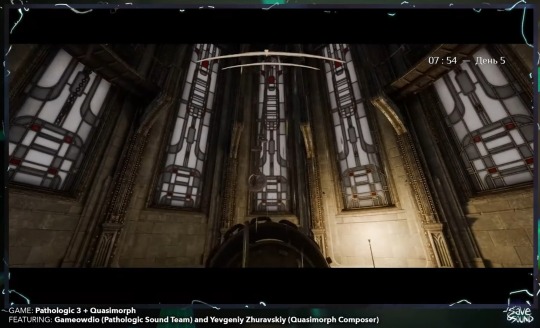
Shots of infected districts!
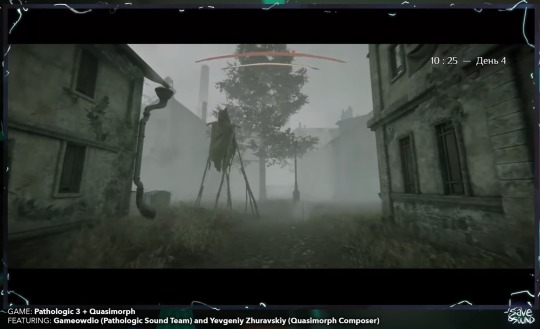
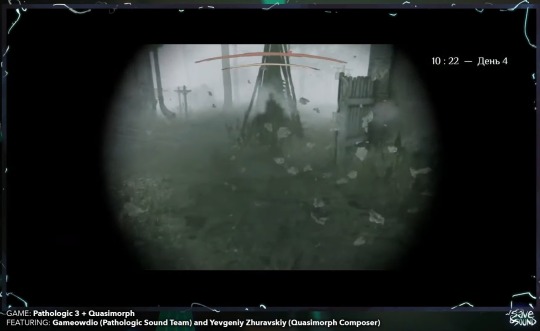
(Also the game has a global wetness parameter now that determines the amount of rainfall and modulates the ambient sounds accordingly..)
Overall it seems like this new soundtrack is going to be incredibly versatile and character driven, and I'm really excited to see how it's going to work in-game!
I've taken a few more screenshots which I'm leaving on a reblog soon if anyone's interested!
#I AM SHAKING#pathologic#pathologic 3#gloves and leather can't keep the world out bachelor boy you are cursed to have the most sensitive mechanics in the world (and psychosis)
219 notes
·
View notes
Text
It sucks so much that as someone with a severe and persistent mental illness it's MY responsibility to jump through hoops and be proactive in contacting people at limited times of the day just to get MY MEDS THAT I'VE BEEN TAKING CONSISTENTLY FOR YEARS
#im pissed off rn cause my pharmacy couldnt refill one of my meds and told me to contact my dr#whose office is closed for the week but online it says they cant perscribe that med anymore????#was someone gonna tell me???#idek what to do now besides get a whole new dr at a different clinic and do all the transfer bullshit just to once again get a med#that i have been stable on for over 5 years#like people always want us schizos to be on our meds but then the system makes it so hard!!!??!!?!?!#tw meds#tw medication#tw caps#schizophrenia#mental illness#nd#neurodivergent#psychosis#schizophrenic#actuallyschizophrenic#mental health awareness#pseriouslypsychotic#actually schizospec
208 notes
·
View notes
Note
Hi! I'm still feral for these two, would you mind giving us some art of them in their later years together!?
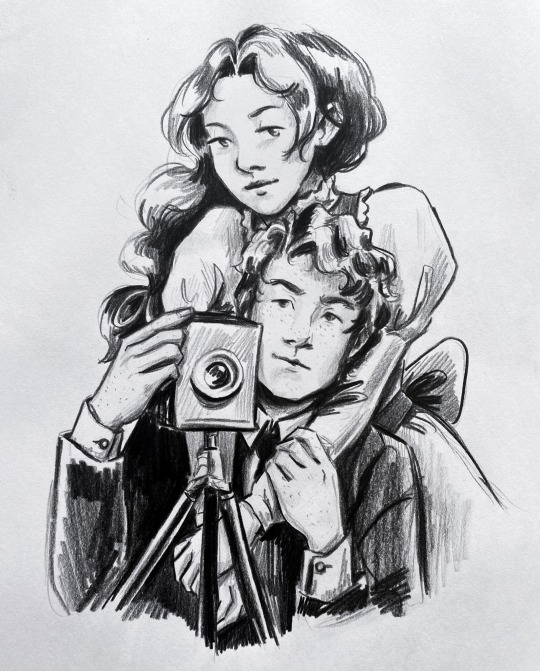




Hello angel!!!!
Sorry it’s taken so long to respond🫶🫶 but I wanted to draw some new art for this ask💓
We have: Sebastian and Eloise trying out their new fancy camera with a selfie, pictures of them with their daughter, and finally…idk I just always felt like this drawing is when they’re a bit older💓
I want to take this ask as an opportunity as well to talk a little about how I imagine their future (I have no chill & you can ignore this and just enjoy the art if you want😇).
I am a COMPLETE pantser - I never know how a chapter’s going to end when I start writing it (I always just have a few scenes I know I need to include to keep the plot moving forward). Although I have different *big* scenes I’m always writing towards, and themes/plot elements I’m always foreshadowing (shout out to @elliecutte for catching *almost* all of my hints and appreciating my general no chill😆), IM STILL NOT 100% SURE HOW I WILL END THINGS !!! 😳 I have a lot of endings I see as possible, and I think soon it will become more clear to me what will work the best💓
HAPPY ENDING:
Eloise and Sebastian become Unspeakables. I have a LOT of thoughts on this profession that could be its OWN post, and I feel like Unspeakables are generally specialized in one or two departments, but as their interests/research change they also change.
Eloise becomes an Unspeakable in the Mind and Death departments, with the occasional foray into Time. Her ancient magic is connected with all of these things (my version of AM is NOT like the game) & the Department of Mysteries is one of the only places that gives her any useful information about these things. Plus she thinks too much (it IS her hobby after all😆💓) and is very introverted so a hermit job like this is a perfect fit.
Sebastian becomes an Unspeakable as well, but I feel like it takes him a long time to specialize in anything, if he ever does. I just feel like becoming an Unspeakable is the adult equivalent of sneaking into the Restricted Section🥹🫶
They grow old together (I won’t explain TOO much) & have a lovely little family🥹 at least one daughter that they both dote on. Sebastian had an amazing childhood (idyllic until it wasn’t), and wants to give his daughter the same, and Eloise works hard to make sure their daughter feels the love that she never had growing up🥺
When Sirius is burned off the family tree, Eloise and Sebastian take him in🥹🫶 (they’re like 100 years old but WIZARDS LIVE LONGER…) The same happened to her all those years ago, and she wants him to know that his whole family hasn’t abandoned him.
Eloise LOVED her nieces - Bellatrix, Andromeda, and Narcissa - when they were younger, but as Voldemort becomes more powerful & people realize WHAT he’s doing, she has to separate herself from them. Her heart breaks seeing Bellatrix go mad, and seeing Narcissa engaged to a Malfoy out of obligation😔 (iykyk)
I haven’t thought any more about happy ending but I think it’s fun to think about how their future story might weave in with the actual canon events, ESPECIALLY since Eloise is a Black🥹💓
SAD ENDING:
After Sebastian gets his hands on Slytherin’s relic, it really starts to consume him and makes him even MORE obsessive than his natural tendencies - I imagine it similarly “talking” to him like Slytherin’s locket/horcrux did in Deathly Hallows (😳)
Eloise is deathly afraid of the changes she’s seeing in Sebastian and steals it from him (he would never willingly give it to her ESPECIALLY if it starts to feel like a precious item to him)
BUT the relic triggers the latent Black Family Madness in her - the madness that afflicts almost every woman in her family since…🤭 - and she herself starts to lose touch with reality. Her body and soul are already destroying themselves between the curse and the ancient magic inside of her, and the relic is what triggers it in her.
Sebastian becomes an Unspeakable, focusing on the Mind, in a desperate attempt to find a cure for his Eloise🥺
He never gives up his research, and sometimes when he comes home she is lucid and they talk about his research - otherwise, he just loves and takes care of her.
(He’s never successful in finding a way to reverse what he feels he caused in the first place - his ambition and single-mindedness is, to him, the reason why all of this happened)
Honestly who knows if I end their story either of these ways😌 I just love thinking of AUs and different endings and I have a few others I’ve considered as well!!! And whatever endings I don’t write will be immortalized on this blog and in my art as well🙏
#thank you for the ask!!!!#I have no chill when I answer these things which is why it takes me so long to answer them🥲#ngl I think the sad ending is quite romantic#but maybe I’m too chicken to follow through/what I have planned could change a lot & it won’t make sense anymore#and like I’m not COMPLETELY evil I like seeing them happy too🥺🥺#and I also really love the Black family & all of the canon characters…OFC I had to insert Eloise in that family somehow#and her mother was the PERFECT age !!!!!!!!!!! (according to the family tree)#I ALSO have a lot of thoughts on the Gaunts and actually how Ominis’s blindness prevents him from going insane like the rest of them#seem to have done by the time Tom Riddle’s around#(something something blind people can’t hallucinate so they can’t get psychosis)#hogwarts legacy#hogwarts legacy fanart#hphl#hogwarts legacy mc#hogwarts legacy oc#eloise babbit#sebastian sallow#sebastian sallow fanart#sebastian sallow x mc#hogwarts legacy fanfic#also Sebastian’s childhood is just based on mine#I grew up in a TINY village and spent all day running outside and having adventures like crazy or readinf like crazy no in-between😆💓#ask
136 notes
·
View notes
Text

phinktober day 2: dnp 2024
#doing phinktober on twt and will b posting them here too :)#art2 and craft2#dnp#phanart#daniel howell#amazingphil#dan and phil#dan howell#phil lester#btw skipped day 1 because drawing self portraits sends me into psychosis and i wish this was a joke lol it’s a whole thing#i have severe facial dysmorphia/blindness towards myself so i genuinely have no clue wtf my face looks like#one of the reasons i have so many tats and a set style#and why i take so many selfies#wow lore dump ok shut up d#phinktober
154 notes
·
View notes